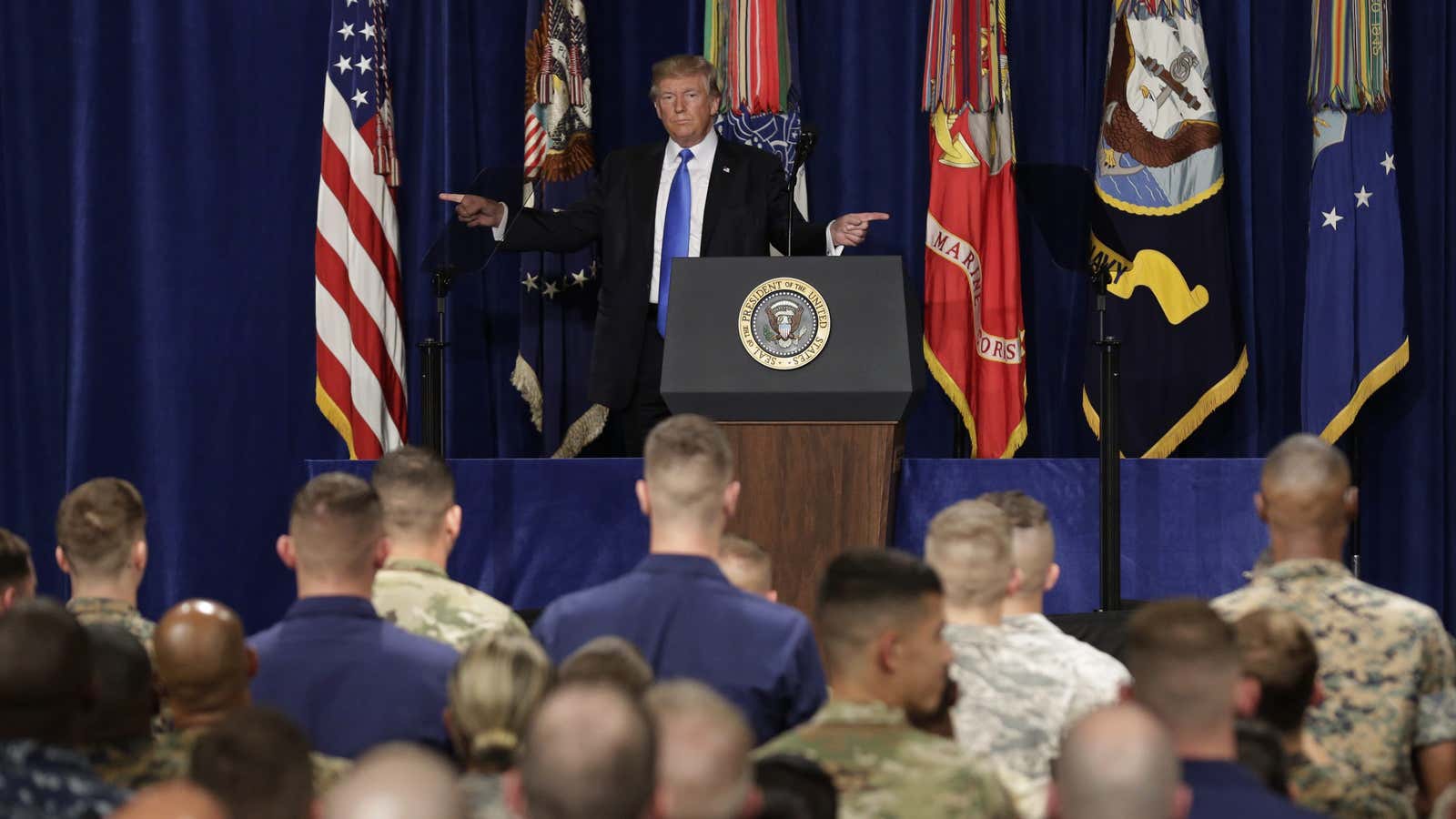US president Donald Trump laid out the US’s new strategy in Afghanistan in a speech from Virginia’s Fort Myer military base on the evening of Aug. 21, telling the assembled troops to prepare for an open-ended war against terrorism in the region, and assigning new roles to Pakistan and India.
“We will not talk about numbers of troops or our plans for further military activities” in Afghanistan, Trump said. “Conditions on the ground, not arbitrary timetables, will guide our strategy from now on.” Pulling troops out of foreign wars was a key plank of Trump’s campaign platform, and he was a frequent critic of former president Barack Obama’s deployment of troops to Afghanistan. The shift could upset his loyal fans, who have stood by as he bypassed presidential norms, and verbally attacked Americans and foreign leaders he disagreed with.
“Ultimately, it is up to the people of Afghanistan to take ownership of their future, to govern their society, and to achieve an everlasting peace,” Trump said, promising to partner with the country, but adding the US was not “nation-building.” In doing so, he echoed speech by president George W. Bush in 2002 (paywall) that set the stage for dramatic increases in US spending and troops there. “Peace will be achieved by helping Afghanistan develop its own stable government,” Bush said at the time.
Trump also indicated the US means to radically change its relationship with Pakistan, where it has spent billions of dollars in aid in recent years, and lean heavily on India to help in the effort to rebuild Afghanistan, while hinting India’s trade with the US could be jeopardized if it did not cooperate. The US can “no longer be silent about Pakistan’s safe havens for terrorist organizations, the Taliban, and other groups that pose a threat to the region and beyond,” Trump said. “We have been paying Pakistan billions and billions of dollars, at the same time they are housing the same terrorists that we are fighting… that will change immediately.”
The US also plans to “further develop” its partnership with India to rebuild Afghanistan, he said. “We appreciate India’s important contributions to stability in Afghanistan, but India makes billions of dollars in trade with the United States, and we want them to help us more with Afghanistan, especially in the area of economic assistance and development.”
There’s no public indication that US diplomats discussed this change in strategy with their Indian counterparts in the days before the speech. US officials have long urged India to play a greater role in rebuilding Afghanistan, and under former prime minister Manmohan Singh India pledged billions of dollars in aid. Last year, India’s current prime minister Narendra Modi pledged $1 billion in aid to the country.
In adopting the “push India, punish Pakistan” strategy, Trump is lifting a page from advisor Lisa Curtis’s playbook. Curtis, a former Heritage Foundation director, CIA analyst, and US diplomat in South Asia, wrote in February that the US “must stop chasing the mirage of securing change in Pakistan’s strategic direction by giving it additional aid or military equipment.” The White House named her its senior national security advisor for the region in April.
John McCain, the Arizona senator, called the move positive, but long overdue, and signaled that he expected an escalation in military spending. “Congress must meet its responsibilities for overseeing the war in Afghanistan and providing the necessary resources for it,” McCain said in a statement.
Senate majority leader Mitch McConnell went a step further, comparing the situation to the US’s huge overseas troop presence after WWII. “Just as the United States maintained forward deployed forces in Japan and Germany after the Second World War and in South Korea after the armistice, a residual presence in Afghanistan and in Iraq, preserves the gains we have made in the respective conflicts in those countries—and America pursues our interests by supporting host nation forces,” he wrote.
